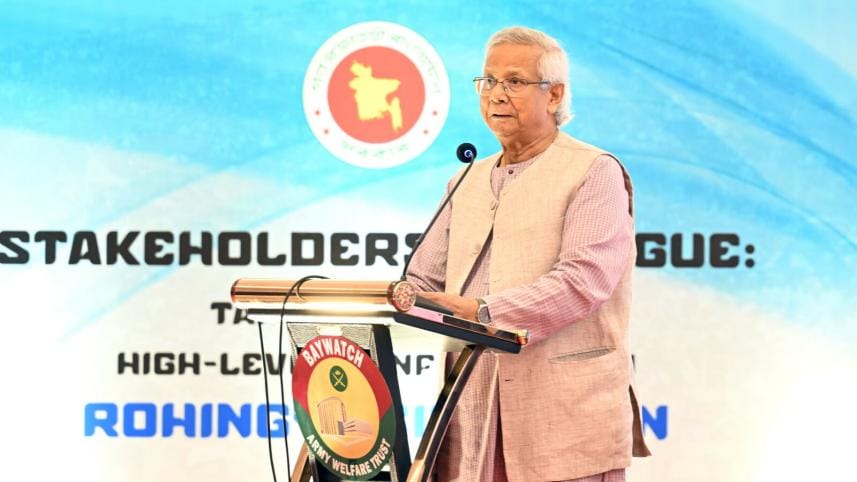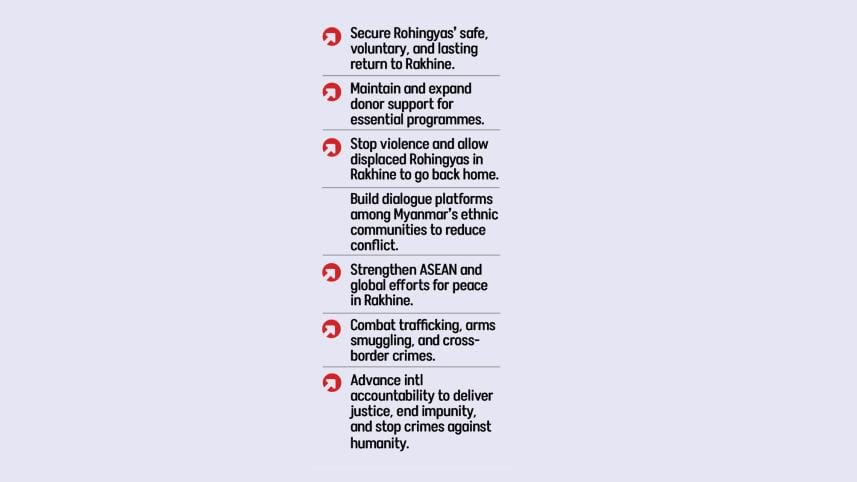‘We mustn’t wait till last Rohingya leaves Rakhine’

Urging the international community to take stronger action to ensure justice, repatriation, and stability for the forcibly displaced Myanmar nationals, Chief Adviser Professor Muhammad Yunus yesterday placed a seven-point proposal to help resolve the Rohingya crisis.
"It is not only the responsibility of Bangladesh, but also of the international community to share the burden of the Rohingya crisis, find solutions, and play an active role in implementing those."
He made the remarks while inaugurating the main session of the three-day international conference titled "Stakeholders' Dialogue: Takeaways to the High-Level Conference on Rohingya Situation", which aims to engage global stakeholders.
The event, held at the Hotel Baywatch in Cox's Bazar, marked the eighth Rohingya Genocide Remembrance Day yesterday.
Explaining the first point of his proposal, Yunus said the umbilical relationship of the Rohingyas with their homeland cannot be severed.
"So, their rights to return to their homeland must be secured. Therefore, we urge all parties and partners to create a practical roadmap for their speedy, safe, dignified, voluntary and sustainable return … We must not be held hostage to mere rhetoric. The time for action is now."
About the second point, Yunus said continued contributions from donors and humanitarian partners are vital to keep life-saving aid running. "We appeal to international donors to enhance their commitments and fill the funding gaps in the Joint Response Plan for 2025-26. At the same time, we urge stakeholders to undertake consolidated efforts for adequate and sustainable funding for the future."
Thirdly, he said, all acts of violence against the Rohingya must cease immediately. "We urge the Myanmar authorities as well as the Arakan Army to ensure safety, security and livelihood of the Rohingyas. They must also allow internally displaced persons from camps in central and northern Rakhine to return home as soon as possible."

In his fourth point, Yunus said a platform for consultation or dialogue is essential to ease tension and end conflict among Myanmar's ethnic communities.
Citing the fifth point, he said the role of the international community, especially ASEAN and neighbouring countries, is indispensable. "We support all international efforts to this end, including the ASEAN 5-Point Consensus. We urge the international community to be more active in advancing peace, security and stability in Rakhine and the region. We also need to fight cross-border crimes such as trafficking, arms smuggling and other criminal activities that threaten stability."
In the sixth point, he urged regional and international stakeholders to stand firm against ethnic cleansing. "We urge all to calibrate their relationship with Myanmar, the Arakan Army and other parties in order to promote an early resolution of this crisis."
Lastly, he also called upon the international community to give more energy to accountability processes at the International Court of Justice, International Criminal Court and elsewhere. "We urge them to implement the provisional measures decided by the ICJ, ensure justice and accountability, and put an end to genocide and crimes against humanity."
Noting that in August 2017, around eight lakh Rohingyas crossed into Bangladesh within a few weeks, he said, "Unfortunately, persecution still persists. Hence, we see fresh arrivals at our doorsteps even today.
"On the eighth Rohingya Genocide Remembrance Day, with a heavy heart, I draw your attention to the forced displacement of Rohingyas… It'll be a historic blunder if we wait until the very last Rohingya leaves Rakhine. We cannot let it happen."
Referring to UN Secretary-General Antonio Guterres' visit to Cox's Bazar during Ramadan this year, Yunus said, "We clearly heard the Rohingyas' strong desire to return home as soon as possible."
Pointing out the three-point proposition he made at last year's UN General Assembly, Yunus said, "In recognition of my call, the high-level conference was envisaged for this year's Assembly. I hope this dialogue here in Cox's Bazar will contribute substantively to shaping the roadmap for an expedited and permanent solution."
Noting that Bangladesh opened its border in a humanitarian gesture despite limited resources, he said, "Bangladesh is currently hosting 1.3 million Rohingyas, making the Cox's Bazar refugee camp the largest in the world."
Around 32,000 new babies are born every year in these camps, he said, while fewer than 5 lakh Rohingyas remain in Myanmar.
"We don't foresee any scope for further mobilisation of resources from our domestic funds, given our own challenges."
Referring to the Rohingyas at the event, he said, "Bangladesh supports and is working relentlessly for a sustainable solution to your crisis. This dialogue is aimed at amplifying your voice in rolling out a roadmap towards early voluntary and sustainable return."
Turning to the international community, he said, "Let's join hands and commit to contribute to their dignified return, ensuring justice and accountability."
Yunus also said Bangladesh has reached stability after last year's uprising and is now ready for the next general election. "We're ready for another transition in our political history. It will be complete when we also see our Rohingya guests return to their own home, in their own environment."
At the beginning of the event, a minute of silence was observed and a documentary on Rohingya persecution was screened.
National Security Adviser Dr Khalilur Rahman, also the high representative for the Rohingya issue, delivered the welcome address. Disaster Management and Relief Adviser Faruk E Azam and UNHCR Assistant High Commissioner Raouf Mazou also spoke.
Diplomats, international experts, Rohingya community representatives, global organisations and academics from home and abroad, along with representatives from the BNP, Jamaat-e-Islami and National Citizen Party, attended the event.



 For all latest news, follow The Daily Star's Google News channel.
For all latest news, follow The Daily Star's Google News channel.
Comments